#Scott Barry Kaufman
Explore tagged Tumblr posts
Text
BEING A LIGHTHOUSE FOR YOUNG MEN LOST IN STORMY WATERS
————— image source One of many things that became apparent amidst the start of the pandemic in early 2020 was how we were about to deep dive even further into a collective state of uncertainty. At that point it already felt like the social contract upon which we thought society firmly stood was deteriorating under our feet. We suddenly found ourselves collectively adrift in the depths of a…

View On WordPress
#Being a Man#Educating Boys#Emotional Agility#Emotional Intelligence#Emotional Literacy#emotional muscle#Engaging Men#Healthy Manhood#Healthy Masculinities#Healthy Masculinity#healthy relationships#Higher Unlearning#Jeff Perera#Masculinity#Men as Helpers#Mindful Manhood#Raising Young Boys#Rebecca Moore#redefine masculinity#Scott Barry Kaufman#Susan David#Toxic Masculinity
3 notes
·
View notes
Text
...so many people today are striving for “transcendence” without a healthy integration of their other needs—to the detriment of their full potential. This ranges from people who expect a mindfulness retreat or yoga class to be a panacea for their traumas and deep insecurities, to spiritual “gurus” abusing their positions of power, to the many instances of vulnerable people (especially vulnerable young people) seeking unhealthy outlets for transcendence, such as violent extremism, cults, and gangs. We also see this at play among the many divisions we see in the world today. While there is a yearning to be part of a larger political or religious ideology, the realization of this yearning is often built on hate and hostility for the “other,” rather than on pride and deep commitment for a cause that can better humanity. In essence, there is a lot of pseudo-transcendence going on, resting on a “very shaky foundation.”
- Scott Barry Kaufman, Transcend
1 note
·
View note
Text
The implication is that it’s good to accept and love who you are, but it’s also good to know that you can change for the better. Ideally, in approaching personality, a person should understand their repeated patterns of thoughts, emotions, and behaviors, and work on improving aspects of their personality that are hindering their happiness. But at the same time, people should not get too focused on drastically changing who they are.
As the psychologist Brian Little points out, “Don’t take your Big Five trait scores too seriously. … You are more nuanced than a single number or five single numbers.” He argues that people should focus on developing their deepest goals, values, interests, and personal projects. These are the things that research shows give life the greatest meaning, and form a more central part of identity than lower-level cognition and perceptions.
To the extent that changing your personality helps you express your values and advance what you see as your purpose in life, it does hold the potential to make you happier. But the most beneficial changes—not only for increased happiness, but also for a deeper sense of identity and meaning—seem to be the ones that make you a more authentic version of who you already believe you are.
— Would You Be Happier With a Different Personality?
#scott barry kaufman#would you be happier with a different personality?#psychology#personality#identity#self improvement
0 notes
Text


INVASION of the BODY SNATCHERS (1978) written by W.D. Richter (from the novel by Jack Finney) produced by Robert Solo directed by Philip Kaufman starring Donald Sutherland Brooke Adams Leonard Nimoy Jeff Goldblum Veronica Cartwright Art Hindle cinematography by Michael Chapman edited by Douglas Stewart music by Danny Zeitlin

JAWS (1975) written by Carl Gottlieb (from the novel by Peter Benchley) produced by Richard D. Zanuck and David Brown directed by Steven Spielberg starring Roy Scheider Robert Shaw Richard Dreyfus Lorraine Gary Murray Hamilton Carl Gottlieb cinematography by Bill Butler edited by Verna Fields music by John Williams

E r a s e r h e a d (1977) written, directed and produced by David Lynch starring Jack Nance Charlotte Stewart Allen Joseph Jeanne Bates Judith Roberts Laurel Near Jack Fisk cinematography by Frederick Elmes Herbert Caldwell edited by David Lynch sound design by Lynch w/ Alan Splet special effects by Lynch w/ Frederick Elmes
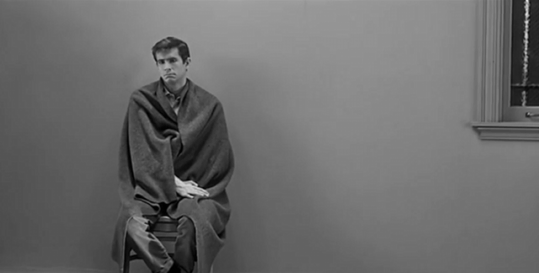
P s y c h o (1960) written by Joseph Stefano (from the novel by Robert Bloch) directed and produced by Alfred Hitchcock starring Anthony Perkins Vera Miles John Gavin Janet Leigh Martin Balsam Simon Oakland cinematography by John L. Russell edited by George Tomasini music by Bernard Hermann

A L I E N (1979) written by Dan O'Bannon (story by Dan O'Bannon and Ronald Sushett) directed by Ridley Scott produced by Gordon Carroll David Giler Walter Hill starring Tom Skerritt Sigourney Weaver Veronica Cartwright John Hurt Harry Dean Stanton Yaphet Kotto Ian Holm cinematography by Derek Vanlint edited by Terry Rawlings music by Jerry Goldsmith

John Carpenter's The THING (1982) written by Bill Lancaster (from the novella "Who Goes There?" by John W. Campbell) directed by John Carpenter produced by David Foster Lawrence Turman Wilbur Stark starring Kurt Russell A. Wilford Briley T.K. Carter David Clennon Keith David Richard Dysart Charles Hallahan Peter Maloney Richard Masur Donald Moffat Joel Polis Thomas Waites cinematography by Dean Cundey edited by Todd Ramsay music by Ennio Morricone

The Exorcist (1973) written by William Peter Blatty (from his novel) directed by William Friedkin produced by William Peter Blatty Noel Marshall David Salven starring Ellen Burstyn Max Von Sydow Jason Miller Lee J. Cobb Jack MacGowran Kitty Winn Mercedes McCambridge Linda Blair cinematography by Owen Roizman edited by Norman Gay Evan Lottman music by Jack Nitzche "Tubular Bells" by Mike Oldfield

R e p u l s i o n (1965) written by Roman Polanski Garard Brach screenplay adaptation by David Stone directed by Roman Polanski produced by Gene Gutowski starring Catherine Deneuve Ian Hendry John Fraser Peter Wymark Yvonne Furneaux cinematography by Gilbert Taylor edited by Alastair McIntyre music by Chico Hamilton
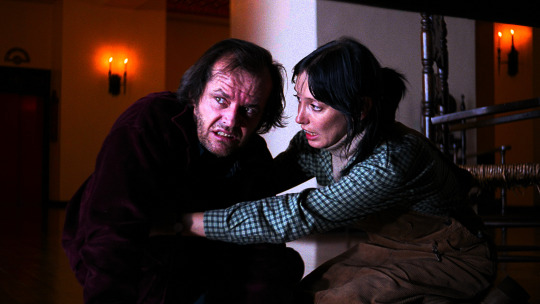
THE SHINING (1980) written by Diane Johnson Stanley Kubrick (from the novel by Stephen King) directed by Stanley Kubrick produced by Stanley Kubrick w/ Jan Harlan starring Jack Nicholson Shelley Duvall Danny Lloyd Scatman Crothers Barry Nelson Philip Stone Joe Turkel cinematography by John Alcott edited by Ray Lovejoy music by Wendy Carlos Rachel Elkind

Night of the Living Dead (1968) written by John Russo George A. Romero directed by George A. Romero produced by Karl Hardman Russell Streiner starring Duane Jones Judith O'Dea Karl Hardman Marilyn Eastman Keith Wayne Kyra Schon Judith Ridley cinematography by George A. Romero (uncr.) edited by George A. Romero (uncr.) Hugh Daly

Bram Stoker's Dracula (1992) written by James V. Hart (from the novel by Bram Stoker) directed by Francis Ford Coppola produced by Francis Ford Coppola Charles Mulvehill Fred Fuchs Michael Apted Robert O'Conner starring Gary Oldman Winona Ryder Anthony Hopkins Keanu Reeves Cary Elwes Richard E. Grant Billy Campbell Sadie Frost Monica Belluci Tom Waits cinematography by Michael Ballhaus edited by Anne Goursaud Glen Scantlebury Nicholas C. Smith music by Wojciech Kilar

TWIN PEAKS fire walk with me (1992) written by David Lynch Robert Engels (from the television series created by David Lynch and Mark Frost) directed by David Lynch produced by David Lynch Mark Frost Gregg Fienberg Johanna Ray John Wentworth starring Sheryl Lee Ray Wise Moira Kelly Grace Zabriskie Chris Isaak Kiefer Sutherland David Lynch Miguel Ferrer Harry Dean Stanton David Bowie Michael J. Anderson Frank Silva Al Strobel Jurgen Prochnow Dana Ashbrook James Marshall Frances Bay Catherine E. Coulson Kimberly Ann Cole Walter Olkewicz Lenny Von Dohlen Madchen Amick Peggy Lipton Julee Cruise Kyle Machlachlan cinematography by Ron Garcia edited by Mary Sweeney music by Angelo Badalamenti

Let the Right One In (2008) written by John Ajvide Lyndqvist (from his novel) directed by Tomas Alfredson produced by Frida Asp starring Kare Hedbrant Lina Leandersson Per Ragnar Henrik Dahl Ika Nord cinematography by Hoyte Van Hoytema edited by Tomas Alfredson Dino Jonsater music by Johan Soderqvist

W A R of the W O R L D S (2005) written by Josh Friedman David Koepp directed by Steven Spielberg produced by Kathleen Kennedy Damian Collier Paula Wagner Colin Wilson starring Tom Cruise Tim Robbins Dakota Fanning Miranda Otto Justin Chatwin Amy Ryan cinematography by Janusz Kaminski edited by Michael Kahn music by John Williams

Hannibal (2001) written by Steve Zaillian David Mamet directed by Ridley Scott produced by Martha De Laurentiis Dino De Laurentiis Ridley Scott starring Anthony Hopkins Julianne Moore Ray Liotta Gary Oldman Frankie Faison Giancarlo Giannini Francesca Neri Zeljko Ivanek Hazelle Goodman cinematography by John Mathieson editing by Pietro Scalia music by Hans Zimmer

The Hunger (1983) written by Ivan Davis Michael Thomas (from the novel by Whitley Strieber) directed by Tony Scott produced by Richard Shepherd starring Catherine Deneuve Susan Sarandon David Bowie Cliff De Young cinematography by Stephen Goldblatt edited by Pamela Power music by Michel Rubini Denny Jaeger

DON'T LOOK NOW (1973) written by Allan Scott Chris Bryant (based on the novella by Daphne Du Maurier) directed by Nicholas Roeg produced by Peter Katz starring Donald Sutherland Julie Christie Hilary Mason Clelia Matania Renato Scarpa cinematography by Anthony Richmond editing by Graeme Clifford music by Pino Donnagio

Prisoners (2013) written by Aaron Guzikowski directed by Denis Villeneuve produced by Broderick Johnson Kira Davis Andrew A. Kosove Adam Kolbrenner starring Jake Gylenhaal Hugh Jackman Maria Bello Viola Davis Melissa Leo Terrence Howard Paul Dano cinematography by Roger Deakins edited by Joel Cox Gary Roach music by Johann Johannsson

The Company of Wolves (1984) written by Neil Jordan Angela Carter (from the short story in Angela Carter's book "The Bloody Chamber and Other Stories") directed by Neil Jordan produced by Chris Brown Stephen Woolley starring Sarah Patterson David Warner Angela Lansbury Micha Bergese Stephen Rea cinematography by Bryan Loftus edited by Rodney Holland music by George Fenton

A Quiet Place (2018) written by Bryan Woods Scott Beck John Krasinski directed by John Krasinski produced by Michael Bay Andrew Form Brad Fuller starring Emily Blunt John Krasinski Millicent Simmonds Noah Jupe Cade Woodward cinematography by Charlotte Bruus Christensen edited by Christopher Tellefsen music by Marco Beltrami

W O R L D W A R Z (2013) written by Matthew Michael Carnahan Drew Goddard & Damon Lindelof (from the novel novel by Max Brooks) directed by Marc Forster produced by Brad Pitt Dede Gardner Jeremy Kleiner Ian Bryce starring Brad Pitt Mireille Enos Daniella Kertesz James Badge Dale Peter Capaldi Pierfrancesco Favino Ludi Boeken Matthew Fox Fana Mokoena David Morse cinematography by Ben Seresin edited by Roger Barton Matt Chesse music by Marco Beltrami

LOST H i g h w a y (1997) written by David Lynch Barry Gifford directed by David Lynch produced by Mary Sweeney Tom Sternberg Deepak Nayar starring Bill Pullman Patricia Arquette Balthazar Getty Natasha Gregson Wagner Robert Loggia Robert Blake Michael Massee Jack Nance Henry Rollins Gary Busey cinematography by Peter Deming edited by Mary Sweeney music by Angelo Badalamenti

N e a r D a r k (1987) written by Kathryn Bigelow Eric Red directed by Kathryn Bigelow produced by Edward S. Feldman Steven-Charles Jaffe Charles Meeker starring Adrian Pasdar Jenny Wright Lance Henriksen Bill Paxton Jenette Goldstein Tim Thomerson cinematography by Adam Greenberg edited by Howard Smith music by Tangerine Dream

S e c o n d s (1966) written by Lewis John Carlino (from the novel by David Ely) directed by John Frankenheimer produced by John Frankenheimer Edward Lewis starring Rock Hudson Salome Jens John Randolph Will Geer Jeff Corey Murray Hamilton Frances Reid cinemtography by Tak Fujimoto edited by David Newhouse Ferris Webster music by Jerry Goldsmith

Nosferatu The Vampyre (1979) written by Werner Herzog w/ Tom Shachtman Martje Grohmann directed by Werner Herzog produced by Walter Saxer Werner Herzog Michael Gruskoff starring Klaus Kinski Isabelle Adjani Bruno Ganz Roland Topor Walter Landengast Martje Grohmann cinematography by Jorg Schmidt-Reitwein edited by Beate Mainka-Jellinghaus music by Florian Fricke Popol Vuh

30 DAYS of NIGHT (2007) written by Steve Niles Stuart Beattie Brian Nelson (from the graphic novel by Steve Niles Ben Templesmith) directed by David Slade produced by Sam Raimi Robert Tapert starring Josh Hartnett Melissa George Danny Huston Ben Foster Mark Boone Jr. Amber Sainsbury Megan Franich Manu Bennett cinematography by Jo Willems edited by Art Jones music by Brian Reitzell

f r e a k s (1932) written by Willis Goldbleck Leon Gordon (from the short story "Spurs" by Tod Robbins) directed and produced by Tod Browning starring Wallace Ford Leila Hyams Olga Baclanova Roscoe Ates cinematography by Merritt B. Gerstad edited by Basil Wrangell

the M i s t (2007) written and directed by Frank Darabont (from the novella by Stephen King) produced by Frank Darabont Martin Shefer Liz Glotzer starring Thomas Jane Laurie Holden Marcia Gay Hardin Andre Braugher Toby Jones William Sadler Frances Sternhagen Jeffrey DeMunn cinematography by Rohn Schmidt edited by Hunter M. Via music by Mark Isham

Invasion of the BODY SNATCHERS (1956) written by Daniel Mainwaring (from the novel by Jack Finney) directed by Don Siegel produced by Walter Wanger starring Kevin McCarthy Dana Wynter Larry Gates King Donovan Carolyn Jones Jean Willes Ralph Dumke cinematography by Ellsworth Fredericks edited by Robert S. Eisen music by Carmen Dragon
3 notes
·
View notes
Text
To Be Read July 2023
The Mind
The Molecule of More: How a Single Chemical in Your Brain Drives Love, Sex, and Creativity―and Will Determine the Fate of the Human Race by Daniel Z. Lieberman & Michael E. Long
The Brain: A Very Short Introduction by Michael O'Shea
Consciousness: A Very Short Introduction by Susan Blackmore
The Mind-Gut Connection: How the Hidden Conversation Within Our Bodies Impacts Our Mood, Our Choices, and Our Overall Health by Emeran Mayer MD
Trick Mirror: Reflections on Self-Delusion by Jia Tolentino
Sensitive is the New Strong: The Power of Empaths in an Increasingly Harsh World by Anita Moorjani
The Highly Sensitive Person by Elaine Aron
Laziness Does Not Exist by Devon Price Ph.D.
Wired to Create: Unraveling the Mysteries of the Creative Mind by Scott Barry Kaufman & Carolyn Gregoire
The Body Keeps the Score: Brain, Mind, and Body in the Healing of Trauma by Bessel A. van der Kolk
Music & The Mind (Art Philosophy, Aesthetics, Neuroaesthetics)
Saved by a Song: The Art and Healing Power of Songwriting by Mary Gauthier
The Song Machine: Inside the Hit Factory by John Seabrook
This is What it Sounds Like: What the Music You Love Says About You by Ogi Ogas & Susan Rogers
Why You Like It: The Science and Culture of Musical Taste by Nolan Gasser
The Story of Music: From Babylon to the Beatles: How Music Has Shaped Civilization by Howard Goodall
Of Sound Mind: How Our Brain Constructs a Meaningful Sonic World by Nina Kraus
Aesthetics: A Very Short Introduction by Bence Nanay
Equipment for Living: On Poetry and Pop Music by Michael Robbins
How Music Works by David Byrne
General Non-Fiction / History / Science
The Russian Revolution: A Very Short Introduction by S. A. Smith
The French Revolution: A Very Short Introduction by William Doyle
Linguistics: A Very Short Introduction by P. H. Matthews
Mathematics: A Very Short Introduction by Timothy Gowers
After the End of Art: Contemporary Art and the Pale of History by Arthur C. Danto
Flappers by Judith Mackrell
Marketing for Dummies, 6th edition by Jeanette McMurty MBA
Sinatra: The Chairman by James Kaplan
Get Happy: The Life of Judy Garland by Gerald Clarke
Self-Improvement
Self-Compassion: The Proven Power of Being Kind to Yourself by Dr. Kristin Neff
Self Compassion for Dummies by by Steven Hickman PsyD (in progress)
The Nice Girl Syndrome: Stop Being Manipulated and Abused -- and Start Standing Up for Yourself by Beverly Engel
The Assertiveness Guide for Women: How to Communicate Your Needs, Set Healthy Boundaries & Transform Your Relationships by Julie de Azevedo Hanks, PhD, LCSW
Anatomy of a Breakthrough: How to Get Unstuck When it Matters Most by Adam Alter
Fierce Self-Compassion: How Women Can Harness Kindness to Speak Up, Claim Their Power, and Thrive by Kristin Neff PhD
The Art of Possibility by Rosamund Stone Zander
Be Angry: The Dalai Lama on What Matters Most by His Holiness the Dalai Lama,
Anger: The Conflicted History of an Emotion by Barbara H. Rosenwein
The Power of Fun: How to Feel Alive Again by Catherine Price
In Awe: Rediscover Your Childlike Wonder to Unleash Inspiration, Meaning, and Joy by John O'Leary
Creating a Life That Matters: How to Live and Love with Meaning and Purpose by Manis Friedman & Rivka Goldstein
Fiction
Babel by R. F. Kuang
The Last Bookshop in London by Madeline Martin
A Journey to the Center of the Earth by Jules Verne (narrated by Tim Curry)
In/Spectre #2
The Goldfinch by Donna Tartt (in progress)
The Poisoner's Handbook ed. Raymond T. Bond
5 notes
·
View notes
Photo
"The dysregulation caused by loneliness consigns us to the extremes of either suffering passively (responding too little) or being “difficult” (responding too intensely)."
— Cacioppo & Patrick, Loneliness (2008)
"When cognitive control is lost, the ability to inhibit the drive to seek pleasure is lost."
— Robert Lustig, The Hacking of the American Mind: The Science Behind the Corporate Takeover of Our Bodies and Brains (2017)
"Personal responsibility, if it wasn't so horribly co-opted by the right, is I think actually very important in my day-to-day life. However, personal responsibility is only as good as the environment in which it exists. And our environment is shit."
— Leslie Fluette, Capitalist Realism, Mental Illness and Societies of Control (2019)
"Unfortunately, not all young children who are maltreated in harsh and unpredictable environments have additional resources to help them cope with the stress—a reality that has deep implications for the long-term consequences of early adversity. In general, when people experience persistent fear and anxiety, the amygdala and hippocampus work together to associate that fear with the context that elicited the fear response. In children or adults, the resulting “fear conditioning” can have lasting effects. As a result of physical abuse, a child tends to become fearful of both the person and the context in which the abuse occurred. Over time, the cues to context can become generalized, and the fear response can be activated by people and places bearing only a small resemblance to the original context of the maltreatment. The processes occur automatically, below the level of conscious awareness; the reflective mind does not participate in or even realize what is happening. As a result, early childhood perceptions that the world is a dangerous place can affect social interactions that occur later in life under far less threatening conditions."
— Scott Barry Kaufman, Transcend: The New Science of Self-Actualization (2020)
"..understanding how patterns of stress can influence regulation, or balance, is the key to understanding how what happened to you is connected to your health—in all domains, mental, physical, and social. It has been estimated that childhood adversity plays a major role in 45 percent of all childhood mental health disorders and 30 percent of mental health disorders among adults. These estimates are consistent with other studies that show increased risk for major depression, anxiety, schizophrenia, and other psychotic disorders following childhood trauma or adverse childhood experiences."
— Bruce D. Perry, What Happened To You?: Conversations on Trauma, Resilience, and Healing (2021)
"Your brain predicts and prepares your actions using your past experiences. If you could magically reach back in time and change your past, your brain would predict differently today, and you might act differently and experience the world differently as a result. It’s impossible to change your past, but right now, with some effort, you can change how your brain will predict in the future. […] More control also means more responsibility. If your brain doesn’t merely react to the world but actively predicts the world and even sculpts its own wiring, then who bears responsibility when you behave badly? You do. Now, when I say responsibility, I’m not saying people are to blame for the tragedies in their lives or the hardships they experience as a result. We can’t choose everything that we’re exposed to. I’m also not saying that people with depression, anxiety, or other serious illnesses are to blame for their suffering. I’m saying something else: Sometimes we’re responsible for things not because they’re our fault, but because we’re the only ones who can change them. […] There is a real biological benefit when people treat one another with basic human dignity. And if we don’t, there is also a real biological consequence, and it eventually trickles down to a financial and social cost for everyone. The price of personal freedom is personal responsibility for your impact on others. The wiring of all of our brains guarantees it."
— Lisa Feldman Barrett, Seven and a Half Lessons About the Brain (2020)

#psychotic#depression#anxiety#pleasure#action#environment#future#loneliness#fear#freedom#schizophrenia#human animal#mental illness#brains#responsibility
39K notes
·
View notes
Text
A reporter becomes the target of a vicious smear campaign that drives him to the point of suicide after he exposes the CIA’s role in arming Contra rebels in Nicaragua and importing cocaine into California. Based on the true story of journalist Gary Webb. Credits: TheMovieDb. Film Cast: Gary Webb: Jeremy Renner Anna Simons: Mary Elizabeth Winstead Fred Weil: Michael Sheen John Cullen: Ray Liotta Ronny Quail: Robert Patrick Norwin Meneses: Andy García Coral Baca: Paz Vega Ricky Ross: Michael Kenneth Williams Sue Webb: Rosemarie DeWitt Alan Fenster: Tim Blake Nelson Russell Dodson: Barry Pepper Jerry Ceppos: Oliver Platt Richard Zuckerman: Richard Schiff Quail’s Girlfriend: Jena Sims Rich Kline: Joshua Close Danilo Blandon: Yul Vazquez Ian Webb: Lucas Hedges Eric Webb: Matt Lintz DEA Agent Miller: Gil Bellows Anonymous Agent: Steve Coulter Leo Wolinsky: Dan Futterman Los Angeles Times Editor: Susan Walters Washington Post Editor: David de Vries Doug Farah: David Lee Garver Female Anchor: Rhoda Griffis Ricky Ross Trial Judge: Jen Harper DEA Agent (uncredited): David Alessi Reporter Washington Post (uncredited): Grace Baine DC Business Woman (uncredited): Shaira Barton Self (archive footage) (uncredited): Nancy Reagan Christine Webb: Parker Douglas Film Crew: Producer: Scott Stuber Director: Michael Cuesta Executive Producer: Peter Landesman Producer: Jeremy Renner Producer: Naomi Despres Executive In Charge Of Production: Louis Phillips Cinematography: Sean Bobbitt Novel: Gary Webb Original Music Composer: Nathan Johnson Executive Producer: Pamela Abdy Executive Producer: Michael Bederman Executive Producer: Don Handfield Editor: Brian A. Kates Production Design: John Paino Casting: Avy Kaufman Costume Design: Kimberly Adams Costume Design: Doug Hall Movie Reviews:

View On WordPress
#american journalist#biography#california#central intelligence agency (cia)#crack cocaine#drug trafficking#government conspiracy#investigative journalism#san jose#Top Rated Movies
0 notes
Link
Định Nghĩa Mới Về Trí Thông Minh PDF & Review https://tramsach.vn/dinh-nghia-moi-ve-tri-thong-minh-pdf/
0 notes
Text
Listen To My Heart: Disney Magic, Psychology, D Wade, Transgender Exploration

Well, it's iHeart podcast day. The media giant has over 800 podcasts, and here are some of the more ear worthy iHeart podcasts.First up, if you're a Disney fan, you'll love this new podcast.
iHeartPodcasts has announced“Magical Rewind, with hosts Will Friedle, star of Disney’s “Boy Meets World,” “Kim Possible” and “My Date With the President’s Daughter”, and actress/dancer Sabrina Bryan, star of Disney’s “The Cheetah Girls” hit movies and a fan favorite from “Dancing with the Stars.”
“Magical Rewind” will offer listeners a weekly dose of nostalgia as Will and Sabrina rewatch iconic Wonderful World of Disney and Disney Channel Original Movies. The duo will break down the glory of Disney releases and share all the behind-the-scenes and all the wonder and enchantment fans can imagine.
Best of all: You don't need a FastPass to listen.
“Magical Rewind” is part of the My Cultura Podcast Network and you can listen to the premiere episode now available HERE.
***********************
I reported on this transition last week, but the ten-year-old The Psychology Podcast has joined the iHeart fold. It's a solid if unspectacular psychology podcast with host Scott Barry Kaufman, a cognitive scientist and humanistic psychologist, who explores intelligence, creativity and the vast depths of human potential.
Accompanied by scientists, thinkers and self-actualized individuals, the show aims to unravel the intricacies of human potential and provide glimpses into the realm of human possibility.
For this show, it's the impressive roster of guests.
***************************************
Since we can get enough of sports, let's at least listen to someone we can admire and enjoy. In The Why with Dwyane Wade, NBA legend Wade sits down with trailblazers in sports, fashion, music and business for intimate conversations about their origins, and the reasons they keep pushing to innovate. Tune in on Thursdays to hear conversations from all-time greats telling intimate, behind-the-scenes anecdotes, struggles and triumphs as they push forward to their next challenge.
If you're into sports, you'll enjoy Dwayne Wade's show.
********************************************
Finally today, here's a show iHeart can be proud of. In theBeauty Translated podcastCarmen Laurent and Janie Danger explore the transgender experience in the United States. In each episode, the duo provides a sardonic take on various aspects of the legal, medical and emotional facets of being trans in the contemporary world.
Tune in on Wednesdays to be part of the conversation with Carmen and Janie.
1 note
·
View note
Text
���In fact, being what the humanistic psychologist Scott Barry Kaufman calls “healthy selfish” – as distinct from “unhealthy selfish” – is really good for us. Healthy selfishness comes from a place of self-love where we prioritise ourselves. Kaufman created the Healthy Selfishness Scale as a way to measure the degree to which an individual practises this – and it reads like rules for a life well lived.’
‘We also live in such a doing culture that it’s difficult for many of us to see how intrinsically good it is to look after ourselves because the benefits are not always immediate, visible or part of the production economy. Ours is a culture that really only celebrates constructive rest.’
0 notes
Text
''Maslow argued that all the needs can be grouped into two main classes of needs, which must be integrated for wholeness: deficiency and growth.
Deficiency needs, which Maslow referred to as "D-needs," are motivated by a lack of satisfaction... The "D-realm" of existence colors all of our perceptions and distorts reality, making demands on a person's whole being: "Feed me! Love me! Respect me!" The greater the deficiency of these needs, the more we distort reality to fit our expectations and treat others in accordance with their usefulness in helping us satisfy our most deficient needs.
In the D-realm, we are also more likely to use a variety of defense mechanisms to protect ourselves from the pain of having such deficiency in our lives. ...
Maslow argued that the growth needs such as self-actualization and transcendence—have a very different sort of wisdom associated with them. Distinguishing between "defensive-wisdom" and "growth-wisdom," Maslow argued that the Being-Realm of existence (or B-realm, for short) is like replacing a clouded lens with a clear one.
Instead of being driven by fears, anxieties, suspicions, and the constant need to make demands on reality, one is more accepting and loving of oneself and others. Seeing reality more clearly, growth-wisdom is more about "What choices will lead me to greater integration and wholeness?" rather than "How can I defend myself so that I can feel safe and secure?" ''
- Scott Barry Kaufman, Transcend
0 notes
Text
According to Janet Polivy and Peter Herman, at University of Toronto, many people fail in reaching their personal-development goals because they have unrealistic expectations about the speed, amount, ease, and consequences of attempts at self-change—a phenomenon they call “false hope syndrome.”
According to their theory, first, people are motivated to adopt a difficult, or even impossible, personal growth goal (e.g., “I want to be thin”). After some initial progress, they ultimately don’t reach it. But after failing, they interpret their failure in a way that makes it seem like it wasn’t inevitable; for instance, the failure was a result of just not working hard enough. So they convince themselves that with a few minor adjustments, they can still achieve success. Finally, with renewed determination, but with only minor changes to their plan or their expectations about the rate of change, they set out again, propelled by their hope for the future, only to once again be disappointed. This cycle can continue forever.
The first step to making real, lasting personality adjustments, then, it seems, is to be critical of any self-development program that touts instant, or even radical, change. Just as it takes many years to develop patterns of thoughts, feelings, and behaviors, it will take some time—perhaps many years—to alter them. But the good news is that change is possible.
— How to Change Your Personality
#scott barry kaufman#how to change your personality#psychology#personality#identity#self improvement#false hope syndrome#janet polivy#peter herman
1 note
·
View note
Link
#narcissism#playing the victim#VICTIM MEnTALITY#identity#arrogance#self righteousness#resilience#anxiety#self reliance#the brain#nuance
0 notes
Text
HMsEx Blog Entry 5
Started editing my Liminal Exhilaration footage of streets and train tracks near my house. Tonight, I’ll go out again using a faster lens because my other lens does not perform well in low light. There was a lot of noise on all the clips and colour correction was quite difficult. However, after looking back at the nature of liminal space imagery, noise is a consistent part of the majority of the images; somewhat tying in with the method of giving the image a “washed out” look, covered in the last entry.
I shot in two image profiles, standard mode and “sunset” mode which made things look very warm and orange; I’d never used the image profiles on my camera before but I think next time I will definitely just stick to standard because now I have to colour grade the warm orange ones differently when I’m already very happy with my colour grade for the standard clips.
I recently found the name of the genre of music I’ve been loving so much recently, Synthwave.
Songs for Liminal Exhilaration:
Memory Reboot – VOJ & Narvent
Night Drive – Timecop1983
After Dark – Mr.Kitty
The Perfect Girl (The Motion Retrowave Remix) - Mareux
Research - Academic
The Psychology Podcast hosted by Scott Barry Kaufman – Steven Kotler chat
Scott made a very interesting point when discussing a recent finding he’s made in a paper to do with the 6 dimensions of curiosity in trying to predict creative achievement in life. He said he thought the dimension of joyous exploration would be the biggest predictor; he said that to their surprise they found that the biggest predictor was thrill seeking. Furthermore, he said that looking at the items on the thrill-seeking curiosity questionnaire they made, that the most common items were to do with the “thrill of mastery”. He didn’t get further into this but just hearing that quite interested me. Coming back to what we discussed the other day, about whether that exhilaration of landing a trick can really come through doing something you’ve done before, I believe this is very reassuring, even though Scott’s talking about curiosity, in the larger scheme of things they were talking about predicting creative achievement. Especially as Darrin made good points on how typically we never feel as elated as when we achieve something for the very first time, this finding of thrill of mastery a motivator for creative achievement to be very much in line with my personal experience, having this drive to perfect my practice, landing something for the first time will feel great but what’s the point if I can’t add this trick to the handful that I can confidently every single attempt, down stairs. So, here we see this constant of achievement, but also a further desire for mastery; I’m very happy this podcast has helped me articulate this because the other day in our conversation I couldn’t quite do so. The mastery that proceeds the first achievement is actually what drives the achievement in the first place, the whole art of skateboarding has always been based on this drive to hone our skills just as those more experienced that we’ve seen before us, seeing their fluency, consistency, and style that they take to every single pop of the tail. That drive is what keeps me hooked, I’m in it for the long run, I’m not here to land it once and then put it on the backburner, I need to own my tricks.
Research - Creative Practice
Principles & Methods for Achieving a Flow State | Voices w/ Vervaeke | John Vervaeke & Kevin Bowers
It’s interesting to hear discussion of the Flow State in that true “in the zone” sense, as in your completing a task with familiarity and ability. This is indeed a very common form of flow but not one that I’ve thought about much when thinking of my Liminal Exhilaration project however it is good that I’ve revisited this as it has decent relevance for my Skate Fear Psychology project. John and Kevin discuss achieving a flow state in a creative sense, to produce creative work and seemingly unblock paths that have been blocked for some reason. This idea of unblocking is very similar to the way that extreme sports enthusiasts view fear; where the average person may see fear as a relevant block that shouldn’t be tampered with.
“I want you to remember this feeling guys, like right now, you feeling it?” – Kevin Bowers
It sounds like Kevin does some really great work that allows people to become conscious of the flow state and what it feels like. This is essential for us to better understand and label the feeling of this state. Having common understanding is the first step towards collectively articulating what exactly the feeling is. However, the inherent subjectivity of exhilaration is a concern; or perhaps this notion is the issue in itself? Is exhilaration truly subjective or is it simply that no one has been able to provide a comprehensive ruleset for what can be deemed as exhilaration? This obviously questions more largely, are all things subjective simply waiting to be made sense of with objective theory, or rather, were all things objective once subjective? Quite perplexing.
Research - Technical
I watched some simple refresher videos on using Rotoscope and proceeded to mask out all my selves from one clip of a car park near my house. This was going well until I went in front of a dark background (I was wearing a black hoodie). Here’s a look:
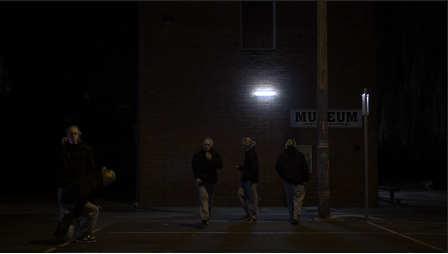
Issues:
In case rotoscoping wasn’t time consuming enough, I have to mask the shadows on the ground and deal with their overlapping which seems hard to be precise with but so far it looks fine.
Didn’t colour correct beforehand, not sure if that’s detrimental or not but should be fine to do it afterwards; I’m just wondering whether it would’ve made rotoscoping easier or not.
Exhilarating Project 1 - Skate fear edit
In contact with my work mate Jesse Brodbeck; he’s a sponsored skater, very experienced and skilful. Organising a day to go filming with him. I’ll make a story board or video plan for that video next week.
Exhilarating Project 2 – Liminal Exhilaration
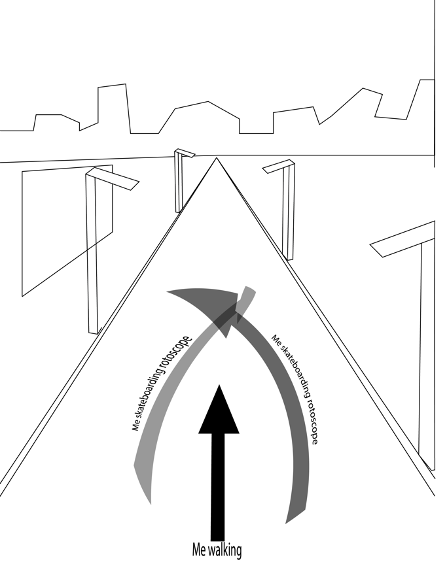
Plan for a shot – There’s this really long footpath that runs along the train line that I skate along on my way to and from Mentone train station. The trainlines on the right and fences of houses on the left. The sketch below is just an idea of the motion that I’d display. Me walking down the centre at a normal speed while rotoscopes of me skateboarding along this road in a sort of snakey 8 shaped pattern are slowed and overlayed.
In many of Schyguyys videos he uses this technique of displaying many of himself moving in the one static environment. This has many implications:
Displays the how one can get lost in the moment while in these spaces, not acknowledging the passing of time. Him occupying multiple areas in the space in just a few seconds (displayed simultaneously) gives us a sense that he is fully in the moment in each position he’s in (similar to flow state) but is obviously moving somewhere and time is passing in this uncontrollable but nonchalant nature.
It’s also generally an unreal and interesting visual effect.
At this point, this effect has been seen many times by most social media consumers so it won’t be too shocking or unreal.
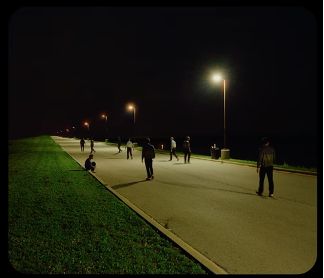
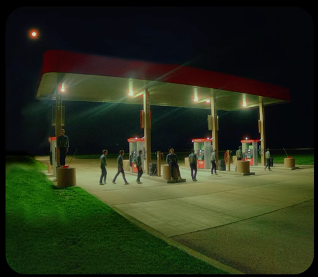
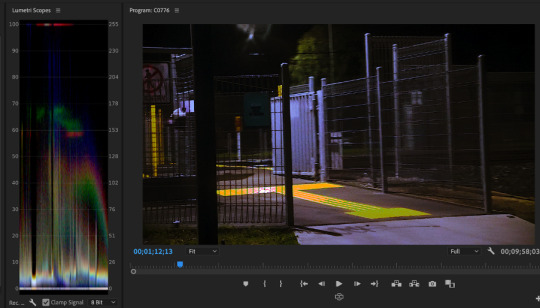
I’m really happy with my first colour grade. A lot of liminal space photography and videography is done with early 2000s or even 90s cameras which give it a “nostalgic” feeling. However, for Gen Z, this shouldn’t be the case; but we still do find that footage like that or footage edited to have more grain and old-school saturation nostalgic or reminiscent in some way, likely for a slightly different reason to millennials.
The result of my colour grade displays the clarity that modern cameras can film and the old school/Y2Kish look commonly used to give a dream-like affect in media today. In a way I believe this is a better choice than just using an old camera because it keeps things looking real and current. I want the viewer to not so much reminisce of the past while in a liminal space (viewing one) but rather be in the present with a subtle nostalgic comfort clouding the mind. This balance of the old and new is liminal in itself. Perhaps liminality is some sort of spirituality I’ve yet to research. We quite often hear “Don’t dwell on on the past” or “focus on the future” when talking about negative experiences, which often annoys me as I know they’re just way to comfort someone and make them feel better. It’s becoming more and more apparent to me that Liminal Spaces are not just liminal because of the cognitive attribution to a transitional/developmental phase (e.g., Streets from age 9-17), they can contain myriad forms of liminality.
My shot displayed above is liminal through the transitional phase attribution, the aesthetic is between real and unreal, and the use of new equipment and but old style is inherently liminal as well.
Let’s focus in on why this is Exhilarating.
We are already aware that exhilaration is not objective and that many people have likely internalised a limited meaning of the word; typically, just a further extent of exciting.
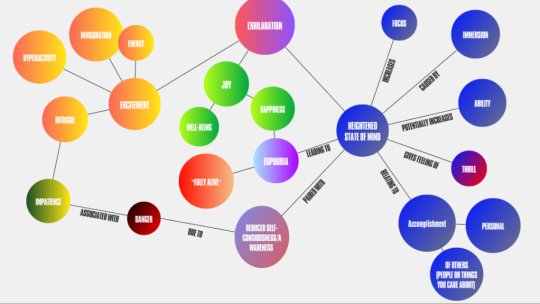
The stylistic choice of having the old style on the clarity of modern video cameras was made through considering how exhilaration without narrative motivation usually needs to make the viewer or experiencer feel as though they’re the present; if the footage looks too unrealistic or unrelatable we won’t easily feel it. Whereas with maintaining the dreamy nostalgic style with the clarity of modern cameras I believe the exhilaration will come more smoothly.
There’s usually some sort of progression to Schyguyys videos. If I want to make my video 40 seconds long it needs a narrative. Some of Schyguyys earlier videos had no narrative, the video that led me to follow him was one of these. Seamless match cuts and Synthwave baby! https://www.instagram.com/p/CkbA8FOA5gf/ So, it’s clear that not having a narrative works for a certain amount of time it’s just unclear how long that is. I’ll have to look further into it.
Heres a little snippit of my rotoscoped mes' doing their thang.
Works Cited:
Kotler, K. Kaufman, S.B. (2023) The Psychology Podcast. [Podcast]. 23 February 2023. Available at: https://open.spotify.com/episode/1YYXQvD4uyU9dzTqxrxu3M?si=PalNPOqrRS6Mw3U1XojL1A&context=spotify%3Ashow%3A4POIiQQjnQOuz0AqnLk3KZ&nd=1
John Veraeke (2022) Principles & Methods for Achieving a Flow State | Voices w/ Vervaeke | John Vervaeke & Kevin Bowers. Available at: https://www.youtube.com/watch?v=iteirgNDKrg
0 notes
Text
Leading Thoughts for June 22 2023
Leading Thoughts for June 22, 2023 https://ift.tt/zDPJsmE IDEAS shared have the power to expand perspectives, change thinking, and move lives. Here are two ideas for the curious mind to engage with: I. Scott Barry Kaufman and Carolyn Gregoire on mindful daydreaming: “It may be wise to question whether we should always be living in the moment and whether this is the best way to foster creative thinking. Finding this ‘middle way’ between mindfulness and mind wandering can help us enjoy the optimal benefits of both ways of thinking. Mindfulness helps us truly see what’s around us—a skill of paramount importance in life and art—but it must be balanced with giving the mind space to dream, fantasize, and simply roam free.” Source: Wired to Create: Unraveling the Mysteries of the Creative Mind II. Martyn Newman on how your self-confidence determines your success: “If you grew up in an environment in which you were continually criticized, you probably learned to focus on your faults and inadequacies. You may do a number of things really well, but when you make a simple mistake, you enlarge it out of proportion. It’s like your attention is conditioned to ignore the things you have done well; instead, it is drawn like a magnet to focus on the negative parts of your performance. And there is a direct relationship between your performance in any area and your level of self-confidence.” Source: Emotional Capitalists: The New Leaders * * * Look for these ideas every Thursday on the Leading Blog. Find more ideas on the LeadingThoughts index. * * * Like us on Instagram and Facebook for additional leadership and personal development ideas. via The Leading Blog: A Leadership Blog https://ift.tt/BxCt1UV June 22, 2023 at 10:48AM
0 notes
Video
youtube
The Science of Happiness: What Really Makes Us Happy
welcome to today's video, where we'll explore the psychology of happiness. We'll discuss what makes people happy and how we can achieve it. And we'll be drawing on insights from the book "Transcend" by Scott Barry Kaufman, a humanistic psychologist who's interested in exploring the full depths of human potential. So, first things first, what is happiness, and how can we achieve it? Happiness is a complex state that involves more than just fulfilling our basic needs. It's also about finding the right goals and purposes in life, cultivating healthy transcendence, and contributing to a good society. We can achieve happiness by pursuing goals that meet our basic needs while helping us grow and make meaningful contributions to the community. We can also cultivate healthy transcendence by seeking experiences that make us feel alive and connected to the world. Speaking of healthy transcendence, what exactly is it, and how does it differ from spiritual narcissism? Healthy transcendence is about seeking experiences that cultivate mindfulness, wonder, and curiosity while staying connected to others. It's not about trying to be above others or pursuing goals to prove our intelligence or impress others. On the other hand, spiritual narcissism is a form of self-transcendence that involves reaching for transcendence without having our different needs met. This could mean thinking that we're enlightened while others aren't or pursuing goals to prove our superiority. On the other hand, Healthy transcendence is all about being connected to others and finding meaning and purpose in our lives. Let's talk briefly about Maslow's hierarchy of needs and how it's been revised in the book "Transcend." Maslow's hierarchy of needs is a model of human motivation that suggests that we have specific basic requirements that must be met before we can pursue higher needs like self-actualization and transcendence. In "Transcend," the hierarchy of needs has been revised with a sailboat metaphor emphasizing the importance of security and growth. Both the boat and the sail are essential for a self-actualized society. The boat's base represents our basic safety, connection, and self-esteem needs, while the sail represents our pursuit of growth and transcendence. Money can play a role in our well-being, but how we spend it is what matters. Can you tell us more about that? Yes, absolutely. People are often more satisfying than things, and experiences can help cultivate mindfulness, wonder, and curiosity, essential resources for creating meaning and fulfillment in life. Spending money on experiences that help increase our high-quality connections can be a better use of money than buying things that only increase our social status or give us power. The last question for today is the importance of goals and purpose in happiness, and how can we find the right goals and purposes for our lives? Finding the right goals and purposes for our lives is crucial to achieving happiness. We can find these by choosing goals that align with our basic needs while helping us grow and contribute to society. Mastery and expertise c
0 notes